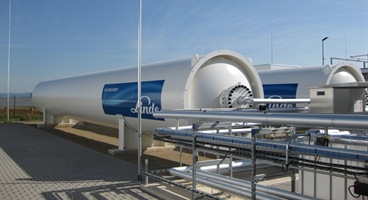However the main difference is that when the hydrogen would warm up due to heat transfer with the environment boil off the tank is allowed to go to pressures much higher up to 350 bars versus a couple of bars for liquid storage.
Cryo compressed hydrogen tank.
Filament winding is a technique that aims to optimally strengthen the liner with long fiber composites to allow the casing to withstand high pressure.
Cryo compressed hydrogen storage refers to the storage of hydrogen at cryogenic temperatures in a vessel that can be pressurized nominally to 250 350 atm in contrast to current cryogenic vessels that store liquid hydrogen at near ambient pressures.
Hydrogen tank 60bar 850l.
The compressed hydrogen is stored in a tank composed of a polymer liner and a composite structure that supports the mechanical forces.
Like liquid storage cryo compressed uses cold hydrogen 20 3 k and slightly above in order to reach a high energy density.
The design of the cryo compressed storage tank is similar to that of a liquid hydrogen tank and consists of an inner vessel taking the form of a carbon fiber reinforced composite pressure vessel with a metal liner an all enveloping layer of vacuum super insulation with multi layer radiation shields to minimize heat input into the inner vessel and a lightweight outer vessel which acts as a vacuum enclosure.
Cryo compressed tanks can store liquid hydrogen supercritical cryogenic hydrogen or hydrogen in a two phase region saturated liquid and vapor.
As pointed out by aceves et al.
The cryo tank will contain between 6 2 kg and 10 7 kg of hydrogen if the tank is refueled with subcritical liquid hydrogen and the initial tank liner and carbon fiber temperature is between 180 k and 300 k.
2006 2010 storing liquid hydrogen in insulated pressure vessels overcomes many of the shortcomings of compressed gas ch 2 or liquid h 2 tanks and may even open new possibilities.
We also specialise in both compressed gaseous hydrogen cgh 2 and cryogenic liquid hydrogen lh 2 which has a temperature of 253 c.
Cryo compressed hydrogen storage limits choice of materials improve resins engineered fibers and composites for cryogenic performance lack of material properties data and investigate material properties throughout understanding of failure mechanisms at 253 c to 120 c cryogenic temperatures lack of applicable codes and standards for develop acceptance testing criteria for base materials acceptance materials and engineered systems.










